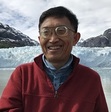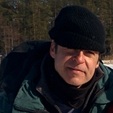ZOOM Link
12h-13h | Bifurcated response of a regional forest to draught
Abstract:
Several lines of evidence suggest that forest growth in many regions is declining as a consequence of changing climate. To predict the fate of forests in the future, a quantitative understanding of how the key climate variables (insolation, precipitation and temperature) interact with forests to cause the decline, is a pressing need. My group has tried to use a regionally-averaged tree-ring width index (RWIr) to quantify forest growth in the Southwest United States (SWUS). We show that over a period of 90 years, SWUS RWIr bifurcated into forest stands with enhanced (healthy) and reduced (declining) branches when regressed on shortwave-radiation and temperature, respectively. The reduced branch was controlled overwhelmingly by drought as measured with a regionally-averaged precipitation–evapotranspiration index (SPEIr). Our results provide insights into how to differentiate functions of climate impacts on forest growth and how to identify tipping-point control parameters for forest regime transitions.

Chuixiang Yi
School of Earth and Environmental Sciences, Queens College of the City University of New York
13h-14h | International development for forest and climate action: a call to embrace theory
Abstract:
Climate action is largely driven by societal needs, including grassroots movements. However, decision-making and implementation are in the end only scallable at national levels. Thus, effective planetary climate action is currently only achievable through forums where nations are the agents behind international agreements, such as the United Nations. FAO, as a technical agency of the UN, has a mandate (by consensus among countries) to provide technical support towards mitigating climate change while ensuring the delivery of increasing societal needs, particularly in developing, largely agricultural nations. Here I aim to highlight some of the current efforts by FAO within the forest sector, including embracing open science and new technologies. However a main caveat is necessary: while new statistical procedures are being used to provide more accurate accounting of mitigation actions, technical support is still lacking embracing the use of theoretical insights into the dynamics of forests and societies. This is particularly critical given current warnings coming from nonlinear signatures exemplified by the existence of tipping points and planetary boundaries.

Javier G. P. Gamarra
Forestry Division, Food and Agriculture Organization of the United Nations
Javier G.P. Gamarra is an International Consultant on Forestry Statistics in the Forestry Division at FAO during the day and independent (non-paid) researcher at night, specializing in forest estimates and particularly uncertainty measures. He got his PhD with the Complex Systems Research Group under Ricard V. Solé and has postdoc and lecturer experience working on Theoretical Ecology, Hydrobiology and Mathematical Epidemiology at Cornell Univ., Univ. of Alberta and Aberystwyth Univ. He is in the scientific and steering committees of science-i and the Global Forest Biodiversity Initiative and is in the editorial board of Scientific Data.
Hosted by Josep Sardanyés (CRM)

